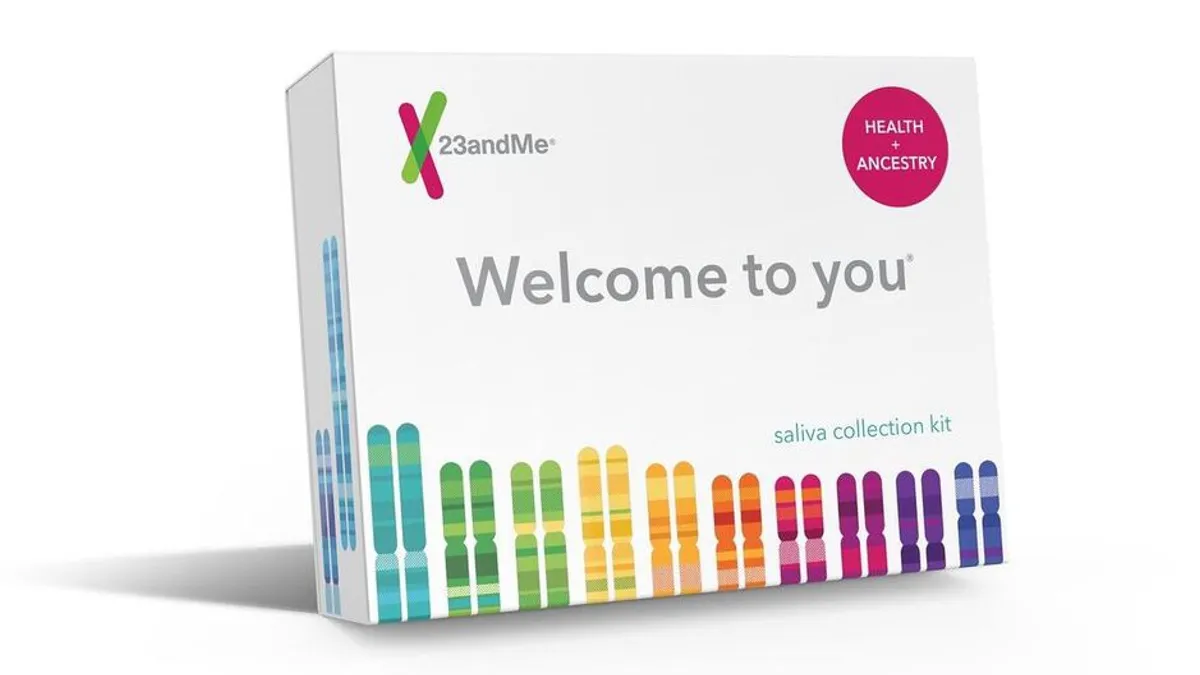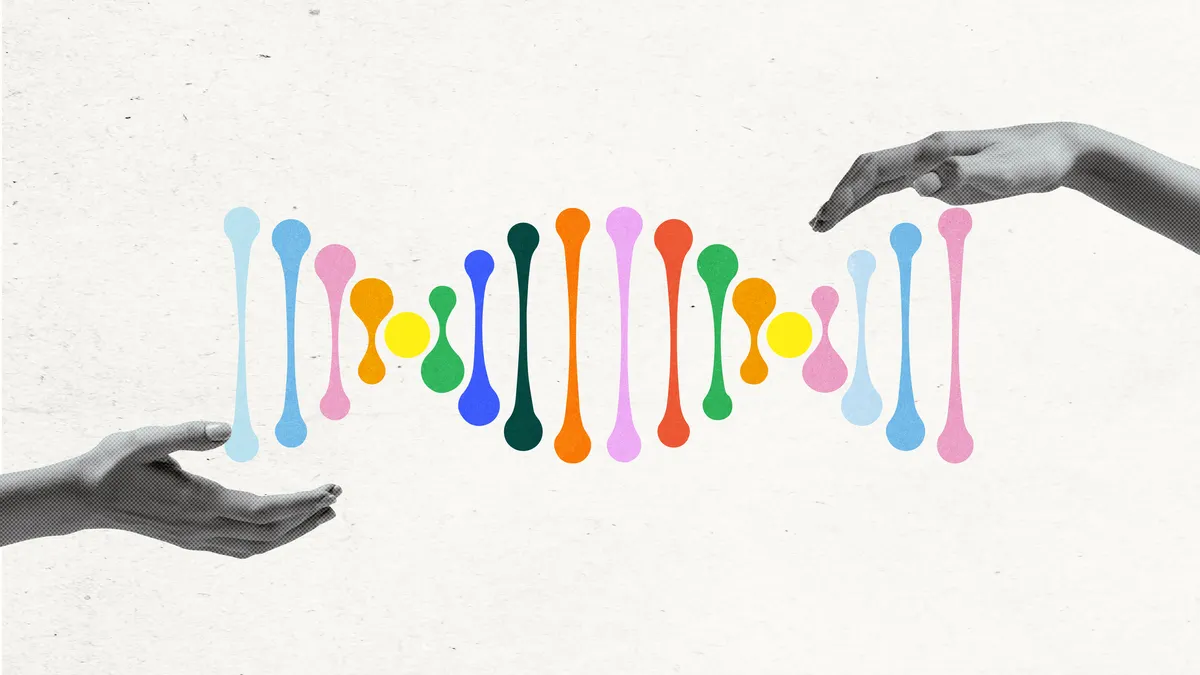As a consumer company, 23andMe is well known in the public sphere for mail-in genetic test kits that provide a detailed family history. But alongside that business, the biotech is also developing drugs using its massive database of genomic information, getting closer to a cancer treatment of its own.

23andMe is building on the success of immunotherapies like Merck & Co.’s Keytruda and Bristol Myers Squibb’s Opdivo, which are checkpoint inhibitors that block a pathway between tumors and the immune system, allowing the body to fight back against cancer. And with a wealth of knowledge at their fingertips, researchers at 23andMe have uncovered new pathways that could have a similar effect and add to the arsenal of oncology drugs, said Dr. Jennifer Low, head of the company’s therapeutics department.
By identifying genetic variants from the world’s largest database, 23andMe found target biomarkers in the CD200 pathway that, when blocked with the treatment 23ME-00610, has shown preliminary clinical benefit in a mid-stage study of patients with neuroendocrine and ovarian cancer. As the first antibody to target this pathway, Low and her team hope this marks a foray into precision medicine that has been discussed in the industry for years.
And 23andMe needs a win. The company has been mired in controversy, from the ethics of using genetic information for research to a high-profile data breach. Last year, the therapeutics division had to cut jobs as biotech investment wanes and the company’s shares circle the drain.
But Low is optimistic about the company’s foothold in the drugmaking arena. Here, we spoke to the therapeutics head about the role genetic databases can play in discovering and developing new treatments for disease like cancer, how understanding demographics would help improve clinical trial diversity and the potential for collaboration with traditional pharma companies in the future.
This interview has been edited for brevity and style.
PHARMAVOICE: How has 23andMe’s huge customer database helped guide the company to the development of oncology checkpoint inhibitors?
DR. JENNIFER LOW: One of the biggest challenges across pharma is that we use animal models to try to understand human biology, but we’re very limited in terms of what will actually translate. Animal models don’t recapitulate what’s going on in people. And so the big advantage to the 23andMe database is that this is human data, human genetics — we have over 15 million genotyped individuals from our customer database, and this allows us to make statistical connections between genetics and what people experience in their biology. We ask about family history and disease, but we also ask them about a lot of other things, like, what is their susceptibility to toenail fungus? Or are they the kind of person who’s always getting attacked by mosquitoes? And this allows us to have subtlety around biology that you’re not going to get in a medical record.
That gives us a large amount of information so that we can also see subtle differences in immune function and how that connects with a propensity for developing cancer. Using that combination of information, we can draw insights into which parts of immune biology may be important for a person’s immune system to be able to see and attack cancer. And we can make tweaks to the drugs that we’re making to realign the immune system to no longer be blind to that cancer.
When you look at the success of immunotherapies like Keytruda, they are still limited by a patient’s genetics. How can 23andMe improve upon that to create what could be the next wave of checkpoint inhibitors?
Checkpoint inhibitors have been a massive advance. In the beginning, immune therapies like interferon or IL-2 were really hard for patients to take and would only offer a smaller chance of long-term survival. Then the PD-1 and PD-L1 immunotherapies brought [survival] up past 20%, which is phenomenal — but 70% to 80% of people still are not getting the long-term benefit. And it’s likely … that there are other checkpoints that are important. So our first program, the CD200R1 program, affects a different checkpoint independent of PD-1 and PD-L1. You need a lot of different options to get the right constellation of effects, and you need to understand more about the immune system you’re trying to activate. Because 23andMe has a much broader understanding of the variability of the immune system, we’re finding targets that allow us to look at many different ways to approach it. We’re really excited about the potential for these drugs.
23andMe has come into some ethical questions about addressing demographics in genetic research. How does the database help bring more diversity into clinical trials?
The FDA is very concerned about the lack of breadth that occurs in a lot of clinical trials, and they want to see that diversity because the American population is very diverse and they need to understand more broadly. With our experience in genetics and increased insights into the differences, the rest of the industry will realize how important it is to have that additional information as well. The U.S. is only 30% of the global market for most drugs, and so it’s really important to think about that.
With precision medicine becoming more advanced, biomarker expansion is critical. Where do you see 23andMe’s database fitting into that down the road?
We’ve been talking for ages about personalized medicine because, even when we have broad labels like lung or breast cancer, for any individual person, their tumor and immune systems greatly influence how their medications will work and what will eventually enable their body to gain control of a tumor. For oncology, we tend to focus on the tumor itself, but we already know that it’s much bigger than that. We’re trying to understand those subtle differences and understand biological processes. And so 23andMe is doing a lot of work to look at multigenic causes and multigenic risk around the propensity for developing disease. I see 23andMe as a critical contributor to how to think about these big problems, and any company that wants to understand some of these aspects would be great to partner with. That’s one mechanism by which our influence could be much, much broader.
What’s the biggest challenge for 23andMe moving forward in the therapeutics area?
This is a tough market right now for small biotechs, which is what we are. As a result, we’ve had to make tough decisions around prioritization and focus — we announced that we needed to scale back our activities and made a really tough decision to let go of a number of our employees within therapeutics. We would love to be able to do everything, but I do feel confident that the organization is leaner, meaner and ready to accomplish a lot in a very efficient way.









